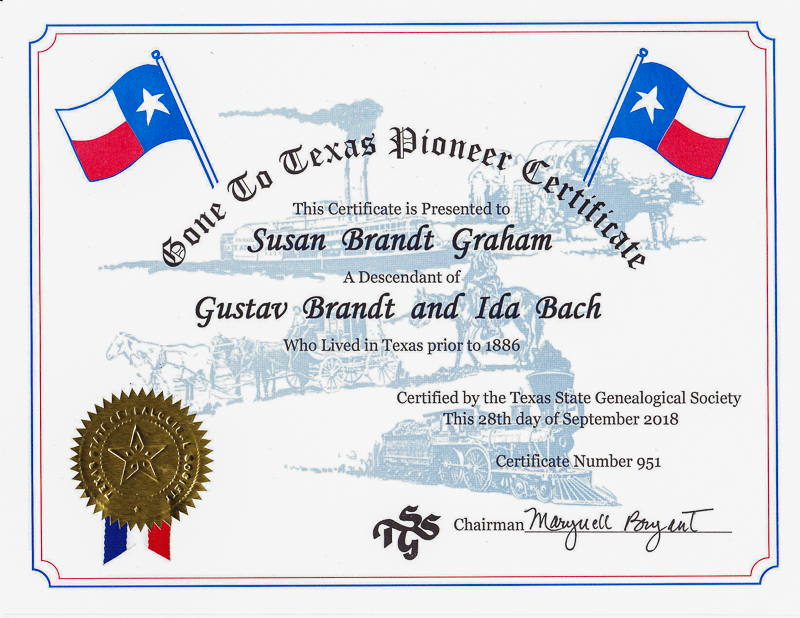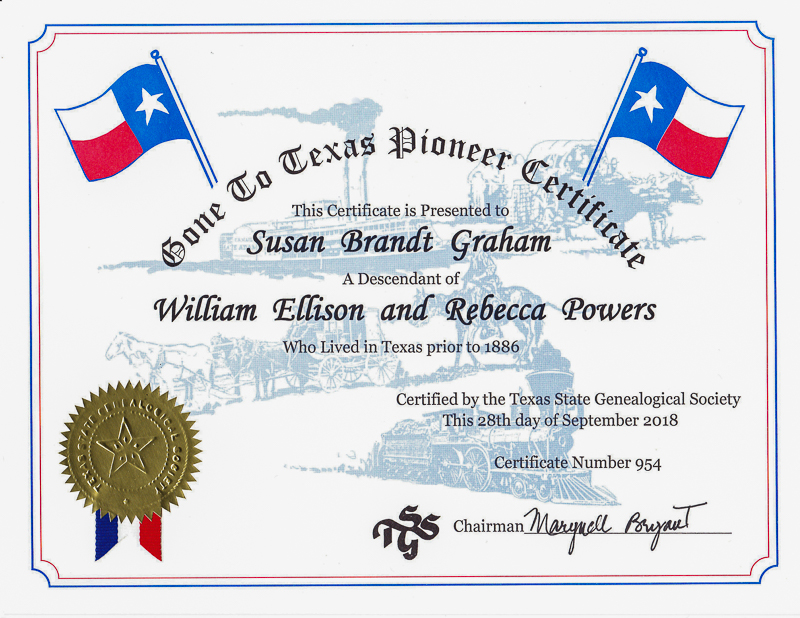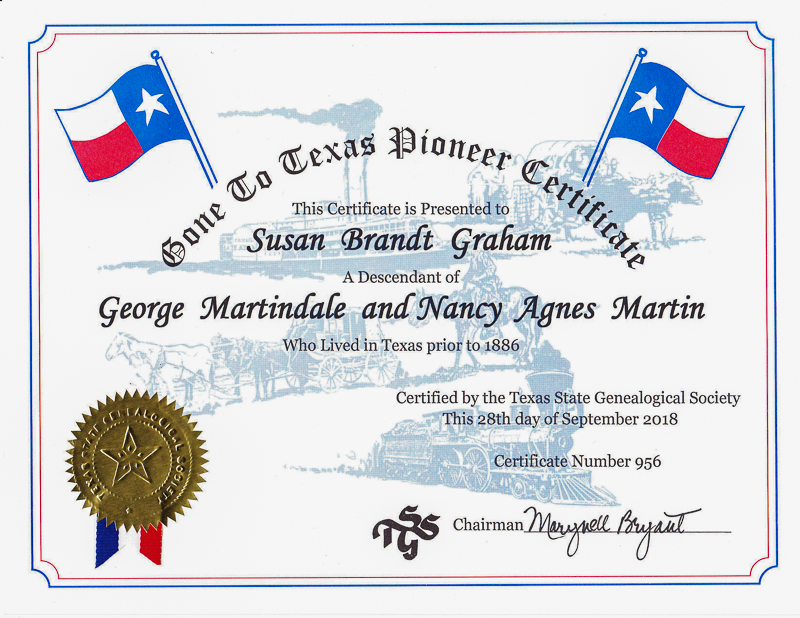- Family Genealogy
Family Genealogy, on the 100th Anniversary of My Father’s Birth
Family genealogy, if allowed, can become an all-consuming hobby. I did not go looking for it. Sometimes things just appear, and you follow your interests. I knew very little about either side of my family until I did a DNA test last December. How that all unwinds is a different story. I had many relatives in Texas; that was not a secret. A big surprise was that my direct lineal ancestors all arrived in Texas, and earlier rather than later. My son and I have been working on our family tree, first concentrating on Texas, because “it’s sorta manageable.” A great aid is the Texas State Genealogical Society, with its Heritage Certificates. Brandt, of course, has the same certificates with his name.
Yesterday, the last of the Heritage Certificates for my father’s side arrived. Although we are still working on my mother’s side, that side is more straightforward. Today is the 100th Anniversary of my father’s birth. My son and I believe we finally understand a part of my father’s line in Texas (just the line; not necessarily individual people). We also believe he and his sister left us hints along the way. One was on my father’s Death Certificate, which I had not read this until this summer. Another was a gift from my aunt when I graduated from medical school: a pair of earrings marked “Charlotte Spencer McKaughan.” I knew nothing about her, but loved the earrings so much they now need a little repair.
The Republic of Texas Days, Prior to Statehood on 19 Feb 1846
The first person in any of my direct lines to arrive in Texas:
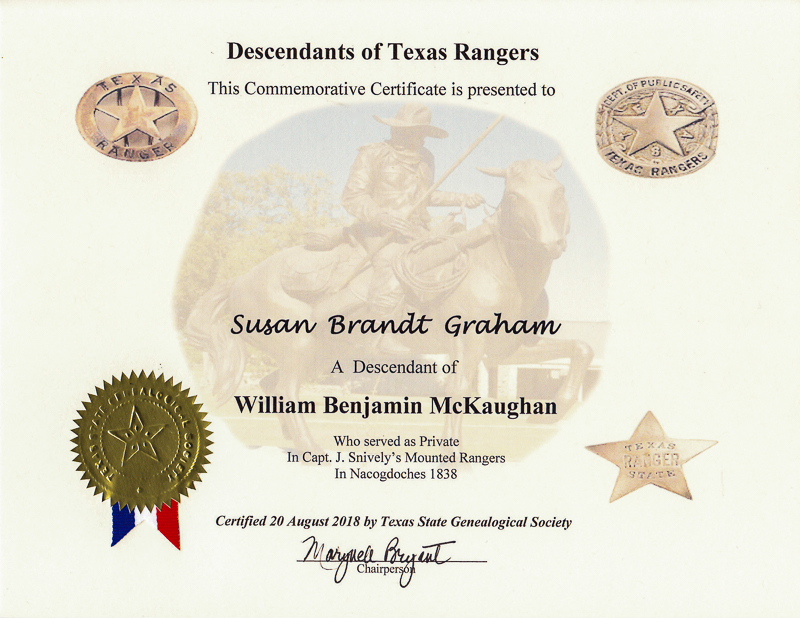
William Benjamin McKaughan arrived in the Republic of Texas as a 19-year-old in May of 1837. The McKaughans had immigrated from Antrim, Northern Ireland, in the 1700’s, settling at first in Pennsylvania. They soon moved westward, into Kentucky and Tennessee. William B. was born in Tennessee, and to the best of my knowledge was the first of his family to go to Texas. He immediately claimed a 640 acre Headright land grant in May of 1837. He was smart. In October of that year the grant would be halved, to 320 acres for a single man. In the summer of 1838 he served as a guard of some type for a county sheriff, for which he was paid $1.25/day. Then, he served in what were in reality very fluid militia companies guarding the frontier, which later evolved into an arm of state law enforcement. These were not the days of badges and uniforms; all able-bodied men were expected to serve, to provide their own horse, weapons and other gear, etc. When the Republic had money, these men were paid $1.25/day, nothing extra for horses and so forth. (We saw that one of our ancestors in the Battle of New Orleans was paid more for use of his horse and its upkeep than he was paid for his service.)
September 14-December 13, 1838
Private with Capt. J. Snively’s Mounted Rangers
“The Kickapoo War”
June 28-August 5, 1839
Private with Capt. Robert “Bob” Smith’s Mounted Volunteers
“The Cherokee War”
No one of my generation knew anything about William B. McKaughan or that he was either an early Texan or Ranger. I don’t know how many of us even knew the name.
T.R. Fehrenbach, in the history tome, Lone Star, wrote of these early Rangers:
The Rangers were to be described many times, at first as state troops, later as a police force or constabulary. During most of the 19th century they were neither. They were apart from the regular army, the militia or national guard, and were never a true police force. They were instead one of the most colorful, efficient, and deadly band of irregular partisans on the side of law and order the world has seen. They were called into being by the needs of a war frontier, by a society that could not afford a regular army. Texans passed in and out of the Rangers regularly; in the early years a very high proportion of all west Texans served from time to time. If they bore certain similarities to Mamelukes and Cossacks, they were never quite the same.
This blog is not where I’ll discuss Manifest Destiny versus genocidal wars, but that may show up elsewhere.
Over time William B. acquired land along waterways and became a merchant. In 1852, he married Charlotte Clarenda Spencer, a widow with one child who had been in the Republic of Texas since at least 1844, and probably since 1840. Her father, Benjamin, received a Headright grant of 640 acres as a man with family in 1840, made unconditional in 1844.
By 1860 William Benjamin McKaughan was well established as a Texas merchant.
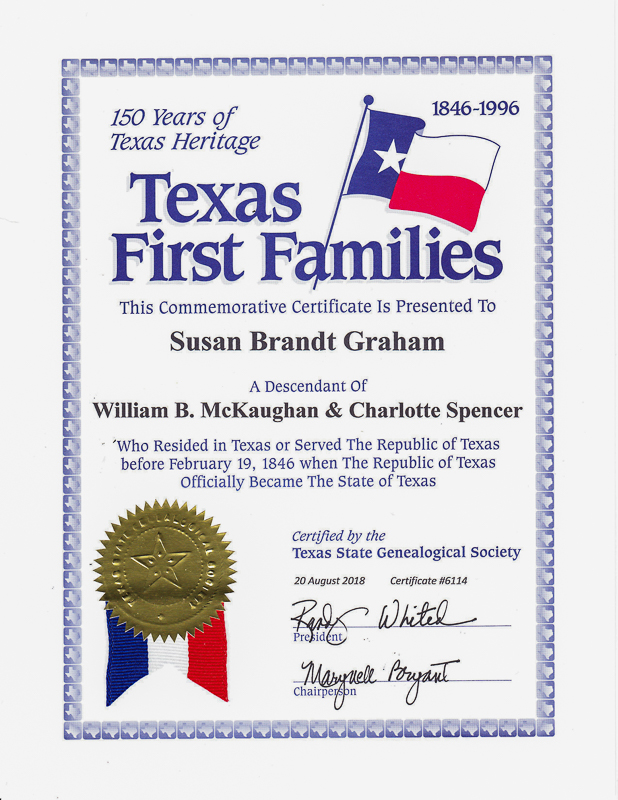
They had four children before the Civil War, one of whom died in infancy and one of whom was my great grandmother, Mary Rosella McKaughan, who became a midwife. (A cousin’s wife told me that – no blood relative told me). After the Civil War they had two more children.
And then came 1868 and he was killed, murdered. The official story is by one of Charlotte’s brothers over “a family matter.” Others say Charlotte did it, and “her brother took the rap.” I don’t know if we’ll ever know what really happened, although I can imagine some different scenarios. I’ll speculate on those elsewhere. There is a cenotaph memorial in the Salado Cemetery; I do not know what happened to his body.
This is Brandt’s take on some of this:
“1838 and 1839 were the two bloodiest years for the Rangers, according to several scholarly writings I’ve read…He must have been something else…Like the rest of them…That no one could kill but his wife…! [ed. note: the identity of the killer remains debated].
Interesting that he was business smart but didn’t want (or didn’t get) to lead in that particular group, but figured out how to make it count after he survived…
The […] are sort of the best of the good in our story, but this guy is part of the real wild west and part of the real story of Texas…”
Finding two early Texans, to say nothing of a true Texas Ranger, hanging out in the branches of our family tree was a fun discovery for us.
When I first began to realize just how Texan I was, whether or not I wanted to be, I read Fehrenbach’s “Lone Star” and still refer to it frequently. We’ve been reading about the Rangers in the Republic of Texas. I watched “Lonesome Dove” sometime in the midst of all this, but before I knew my 2nd great grandfather was a Ranger. I remember the last scene, Woodrow Call standing against the sunset, waving off a newspaper reporter from San Antonio, thinking about the people who had come and gone through his life. Now I wonder if any of William B.’s old Ranger buddies lived longer and remembered him as time passed.
I have never thought of myself as a “Texan,” and I don’t know if I ever will. My son has embraced his Texas heritage. Some of you know the work we did together on severe red deficient color vision. Our texts now are about Texas (and US history) and the place of our ancestors – and us – in it. The current working title for the book has become “Reluctant Daughter, Proud Son of Texas.” It’s family…another collaborative effort
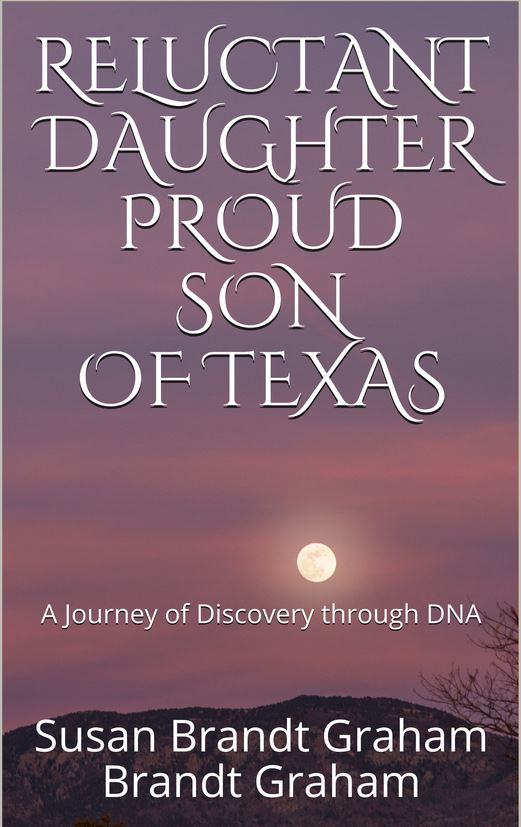
So, that is my father’s great grandfather and great grandmother.
More of My Father’s Lines in Texas
These are the other lines on his side, and more about them will show up later.
